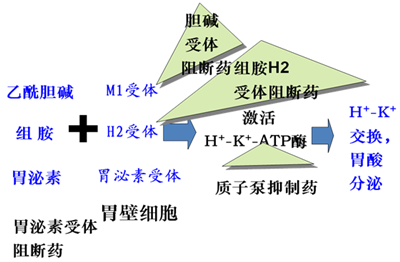常用的对抗胃酸的药物有三类,分别是:传统的中和胃酸药物、H2受体拮抗剂(H2RA)和质子泵抑制剂(PPI)。后两者通过抑制胃酸分泌来发挥抗酸的作用。
传统的止酸剂对消化性溃疡的疗效不是很理想,H2RA出现于20世纪70年代,是酸相关性疾病治疗上的里程碑,但仍然无法满足全部的临床需求,此后抑酸作用更强的PPI问世,使溃疡病、胃食管反流病(GERD)的治愈率不断提高[1]。

疗效上,H2RA中,法莫替丁作用较强,口服剂型在临床较为常用,而PPI的抑酸作用强于法莫替丁[2, 3],因此对于消化道溃疡[4, 5]、幽门螺杆菌[6, 7]患者疗效更好,是治疗这类疾病的一线治疗药物。对于预防和治疗阿司匹林引起的消化道损伤,二者作用相似,PPI效果略好[8, 9]。因此,无论是预防还是治疗应用,PPI均作为用药的选择。
那么,H2受体拮抗剂的应用价值何在呢?笔者总结以下几点:
1. PPI可能存在夜间酸突破(NAB)现象,即指应用标准剂量PPI的患者在夜间(22 :00~6 :00)胃内pH <4 .0且持续超过60 min的现象。这种现象不利于溃疡愈合,除调整PPI治疗方案外,睡前加服小剂量的H2RA可降低NAB的发生率[10]。
2.在PPI禁忌(如过敏)、经济条件不允许的时候,可考虑换用价格相对便宜的法莫替丁[11]。
3.因PPI抑酸作用很强,长期应用可能会导致高胃泌素血症、维生素B12吸收障碍、低镁血症、骨质疏松、骨折、小肠细菌过度增殖、获得性肺炎等[12]。在预防性使用时,对于高危患者可在抗血小板治疗的前6个月联合使用PPI,6个月后改为H2RA或间断服用PPI[13]。
4.第4代H2RA罗沙替丁具有较西咪替丁、雷尼替丁和法莫替丁更好的疗效和安全性,在抑制胃酸和治疗溃疡的疗效方面与奥美拉唑、泮托拉唑相当[14]。
此外,法莫替丁不与肝脏细胞色素P450酶作用,对于潜在药物相互作用的情况,可考虑优先使用。
补充:
1.消化道出血高危人群包括:年龄≥65岁,消化道溃疡或出血病史,合并Hp感染,联合或大剂量使用抗血小板药、抗凝药、NSAIDs、糖皮质激素或SSRIs等药物治疗[15, 16]。
2.溃疡同时合并幽门螺杆菌感染,应先根除幽门螺杆菌,这样可降低药物致溃疡的发生率。
References
[1]姚光弼.酸相关性疾病治疗的前沿——从H_2受体拮抗剂到质子泵抑制剂.中华消化杂志. 1999. (S1): 5-6.
[2] Tolbert K, Bissett S, King A, et al. Efficacy of oral famotidine and 2 omeprazole formulations for the control of intragastric pH in dogs. J Vet Intern Med. 2011. 25(1): 47-54.
[3] Shimatani T, Inoue M, Kuroiwa T, et al. Which has superior acid-suppressive effect, 10 mg omeprazole once daily or 20 mg famotidine twice daily? Effects of single or repeated administration in Japanese Helicobacter pylori-negative CYP2C19 extensive metabolizers. Dig Dis Sci. 2007. 52(2): 390-5.
[4] Tunis SR, Sheinhait IA, Schmid CH, Bishop DJ, Ross SD. Lansoprazole compared with histamine2-receptor antagonists in healing gastric ulcers: a meta-analysis. Clin Ther. 1997. 19(4): 743-57.
[5] Gisbert JP, González L, Calvet X, Roqué M, Gabriel R, Pajares JM. Proton pump inhibitors versus H2-antagonists: a meta-analysis of their efficacy in treating bleeding peptic ulcer. Aliment Pharmacol Ther. 2001. 15(7): 917-26.
[6] Hu FL, Jia JC, Li YL, Yang GB. Comparison of H2-receptor antagonist- and proton-pump inhibitor-based triple regimens for the eradication of Helicobacter pylori in Chinese patients with gastritis or peptic ulcer. J Int Med Res. 2003. 31(6): 469-74.
[7] Scarpignato C. Antisecretory drugs, Helicobacter pylori infection and symptom relief in GORD: still an unexplored triangle. Dig Liver Dis. 2005. 37(7): 468-74.
[8] Chan FK, Kyaw M, Tanigawa T, et al. Similar Efficacy of Proton-Pump Inhibitors vs H2-Receptor Antagonists in Reducing Risk of Upper Gastrointestinal Bleeding or Ulcers in High-Risk Users of Low-Dose Aspirin. Gastroenterology. 2017. 152(1): 105-110.e1.
[9] Nema H, Kato M. Comparative study of therapeutic effects of PPI and H2RA on ulcers during continuous aspirin therapy. World J Gastroenterol. 2010. 16(42): 5342-6.
[10]李孝东,陈洪忠.质子泵抑制剂的夜间酸突破及治疗对策.药学研究. 2013. 32(8): 487-489.
[11] Murakami K, Okimoto T, Kodama M, et al. Comparison of amoxicillin-metronidazole plus famotidine or lansoprazole for amoxicillin-clarithromycin-proton pump inhibitor treatment failures for Helicobacter pylori infection. Helicobacter. 2006. 11(5): 436-40.
[12] Chen J, Yuan YC, Leontiadis GI, Howden CW. Recent safety concerns with proton pump inhibitors. J Clin Gastroenterol. 2012. 46(2): 93-114.
[13]抗栓治疗消化道损伤防治专家组.抗栓治疗消化道损伤防治中国专家建议(2016·北京).中华内科杂志. 2016. 55(7): 564-567.
[14]黄建权,吕俊玲,胡欣.罗沙替丁醋酸酯药理作用与临床评价.中国新药杂志. 2014. 23(14): 1601-1605.
[15]抗血小板药物消化道损伤的预防和治疗中国专家共识组.抗血小板药物消化道损伤的预防和治疗中国专家共识(2012更新版).中华内科杂志. 2013. 52(3): 264-270.
[16] Ahsberg K, H?glund P, Kim WH, von HCS. Impact of aspirin, NSAIDs, warfarin, corticosteroids and SSRIs on the site and outcome of non-variceal upper and lower gastrointestinal bleeding. Scand J Gastroenterol. 2010. 45(12): 1404-15.
(临床药师王楠)
|
